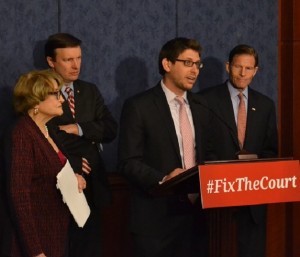On Anniversary of Ethics Bill Introduction, Fix the Court Calls on the Justices to Adopt Binding Code of Conduct
Fix the Court executive director Gabe Roth is marking the anniversary of the introduction of the Supreme Court Ethics Acts of 2015, H.R.1943 and S. 1072, by issuing the following statement:
While Supreme Court justices are required to follow certain conflict-of-interest laws, why they insist on remaining exempt from the more stringent Code of Conduct for U.S. Judges remains a mystery. To reference the code, ‘avoiding impropriety and the appearance of impropriety’ would seem to be a top priority for the nation’s top legal officers.
To my knowledge, none of the justices has committed an impeachable offense, but all eight in recent years have been culpable of various ethical oversights that, to an outside observer, may appear improper.
Just last month Justice Ruth Bader Ginsburg heard an abortion suit stemming from a Texas law that she was openly critical of soon after it passed. In 2012 and 2015 Justice Elena Kagan did not step aside from cases related to the Affordable Care Act, though it is more than reasonable to believe she was involved in crafting its legal defense when working in the Obama White House. In 2010 Justice Clarence Thomas voted in favor a striking down certain campaign finance laws around the time he attended a meeting organized by the Koch brothers, who are known for their vociferous opposition to such laws.
Chief Justice John Roberts and Justices Stephen Breyer and Samuel Alito have sat on more than two dozen cases in the last few years in which companies whose stocks they own filed an amicus brief; the three sided with those companies nearly 70 percent of the time. In the 1980s and 1990s Justice Anthony Kennedy along with six of his colleagues accepted dozens of paid trips from West Publishing, a regular high court litigant whose arguments the justices frequently favored.
Since Congress can legislate institutional changes to the high court – from dictating the number of justices who serve to its annual budget – it may use its statutory authority to compel acceptance of the code of conduct. Yet since ethics is not a partisan issues, it’s odd that recent efforts have been single-party.While the current bills in Congress (at right: FTC’s Roth speaking at the ethics bill introduction in Washington a year ago) relate back to the 2011 revelation that Justices Scalia and Thomas participated in a policy retreat funded by Republican donors, that issue is long past and bipartisanship should rule the day.
For a stronger ethics code to be implemented, Congress isn’t, in fact, needed. Instead, Chief Justice Roberts should show moral leadership and encourage his colleagues to agree to adhere to a stronger ethics rubric.
That would be a sure sign the court is actually as collegial as we’ve been told it is – a cohesive body dedicated to justice and not merely a collection of eight disparate law offices.
